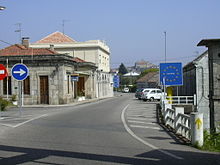
Back حدود مفتوحة Arabic Frontera abierta Spanish مرز باز Persian Frontière ouverte French Perbatasan terbuka ID پرانیستی سرحد Pashto/Pushto Odprta meja Slovenian Відкритий кордон Ukrainian
This article needs additional citations for verification. (August 2020) |

An open border is a border that enables free movement of people (and often of goods) between jurisdictions with no restrictions on movement and is lacking substantive border control.[1][2] A border may be an open border due to intentional legislation allowing free movement of people across the border (de jure), or a border may be an open border due to a lack of legal controls, a lack of adequate enforcement or adequate supervision of the border (de facto). An example of the former is the Schengen Agreement between most members of the European Economic Area (EFTA and the EU). An example of the latter has been the border between Bangladesh and India, which is becoming controlled. The term "open borders" applies only to the flow of people, not the flow of goods and services,[3] and only to borders between political jurisdictions, not to mere boundaries of privately owned property.[4]
Open borders are the norm for borders between subdivisions within the boundaries of sovereign states, though some countries do maintain internal border controls (for example between the People's Republic of China mainland and the special administrative regions of Hong Kong and Macau, or between the United States and the unincorporated territories of Guam, the Northern Mariana Islands and American Samoa, and the Minor Outlying Islands). Open borders are also usual between member states of federations, though (very rarely) movement between member states may be controlled in exceptional circumstances.[a] Federations, confederations and similar multi-national unions typically maintain external border controls through a collective border control system, though they sometimes have open borders with other non-member states through special international agreements – such as between Schengen Agreement countries as mentioned above.
In the past, many states had open international borders either in practice or due to a lack of any legal restriction. Many authors, such as John Maynard Keynes, have identified the early 20th century and particularly World War I as the point when such controls became common.[5]
There have been sporadic attempts to promote global open borders as a viable policy option. The participants in an 1889 International Emigration Conference in London affirmed “the right of the individual to the fundamental liberty accorded him by every civilised nation to come and go and dispose of his person and destinies as he pleases."[6] Currently, immigration is more restricted and harder for low-skilled and low-income people.[7]
- ^ Niño Arnaiz, Borja (2022). "Should we open borders? Yes, but not in the name of global justice". Ethics & Global Politics. 15 (2): 55–68. doi:10.1080/16544951.2022.2081398.
- ^ Altundal, Ugur (2022). "The open borders debate, migration as settlement, and the right to travel". Critical Review of International Social and Political Philosophy: 1–25. doi:10.1080/13698230.2022.2040202.
- ^ Plenary Debate no 4. Friday 24 August 2001: Why borders cannot be open (PDF). International Union for the Scientific Study of Population : XXIV General Population Conference, Salvador da Bahia, Brazil. 24 August 2001. Retrieved 2016-04-11.
- ^ "Definition of "open border"". dictionary.cambridge.org. Archived from the original on 2016-05-03. Retrieved 2017-09-09.
- ^ Keynes, John Maynard (1920). "2". The Economic Consequences of the Peace. New York: Harcourt Brace.
- ^ Casey, John P. (2010-09-14). "Open Borders: Absurd Chimera or Inevitable Future Policy?". International Migration. 48 (5). Wiley: 14–62. doi:10.1111/j.1468-2435.2009.00514.x. ISSN 0020-7985.
- ^ Casey, John P. (2009). "Open Borders: Absurd Chimera or Inevitable Future Policy?". International Migration. 48 (5): 14–62. doi:10.1111/j.1468-2435.2009.00514.x.
Cite error: There are <ref group=lower-alpha> tags or {{efn}} templates on this page, but the references will not show without a {{reflist|group=lower-alpha}} template or {{notelist}} template (see the help page).